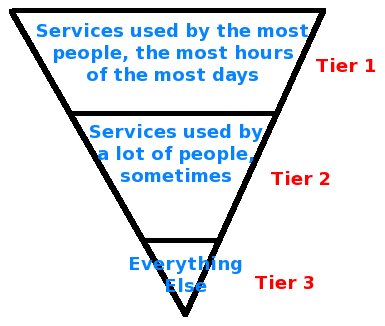Billboarding used to be the way to share groups of read-heavy bit or small-byte data across numerous processes or systems. The concept was simple: Have a file with a bunch of zeros in it, and on occasion change one of the zeros to a one. Processes/systems reading that file would say “Hmmm, the 4th ‘slot’ is now a ‘1’, and that means [thing]”. This was used for everything from node status, to process states, to primitive anticipatory scheduling. Then objects became popular. Why read out of a billboard, when you can just share flag data across objects?
Well they’re back, it seems. Billboards have made a small-yet-noticeable resurgence in a number of systemic regions, and more than a couple system architects have noticed clients requesting solutions that boil down to billboarding (although generally given a more sexy name like “shared state file” or “offline node graph”).
I’ve had two projects in the last 6 months that have required, in general, a billboard, and am very happy to see them come back into vogue. They’ve been “gone” long enough so that the cool kids think they’re brilliant and “out-of-the-box” when they propose the “radical concept” of the “shared state file”, and those of us who’ve been doing advanced system architecture for .. gasp .. almost 15 years now, just smile and jot “billboard” in our notepad.
Systemic Billboards
In environments where there is shared (and preferably clustered) storage, billboards make a ton of sense as a means of easily communicating with other nodes. More than just 0’s and 1’s, a node can communicate an array of information about its health – and also other nodes can ask other nodes to do something. Maybe setting a node state to ‘2’ means “please restart your user services” or ‘3’ means “please reboot”. Whenever a node reads its own entry it can go “Hey cool, I’m suppose to do something.” As a means of pre-failure fencing, this is exceptionally handy as one does not necessarily have a connection to a greater network, but still may have a connection to storage- Allowing a control system to tell others “Hey, something bad is happening, please shut down”, for example if one node detects a UPS failure or pending drainage.
I currently have a project that requires the assumption that if bad things happen, the only communication available between nodes will be a shared IEEE1394 drive array – A better place to use a billboard does not exist.
Non-Systemic, or Quasi-Systemic BillboardsÂ
Given an application that may have any number of processes (for example, any web-based application), using a billboard as a light IPC for each process to communicate its state or intentions, can save a lot of otherwise tricksy IPC coding. Sure, you can have a pipe dangling out there- But what happens if a process needs to skip a pipe read for a given cycle, and in the mean time the status of the pipe changes? Yes, you could have one pipe per process, but then you’re looking at a mess that could be more elegantly solved with … a billboard. With 256 ASCII characters available (I’m not even going to get into the possibilities with Unicode), you can communicate up to 255 different things per process– all sitting happily waiting to be read whenever is convenient, or necessary, with very very little side-effect.
Yes, contention issues need to be addressed by your application.
Yes, if your application is poorly designed and process spawn rates are out-of-control, a billboard will destroy your performance.
Yes, if your storage disappears, there is a problem: A big problem that a web application cannot solve, so its inability to get to the billboard could definitely be a sign that maybe it should go into a maintenance state instead of processing transaction it can’t actually handle.
Yes, if the file becomes corrupted, Bad Things could happen: The application can/should detect such problems and Do The Right Thing.
There are certainly situations where billboards are not the answer. There are certainly situations where using IPC or nodal communication is a better solution. I’ve never advocated billboards as the end-all of inter-process or inter-nodal communication: Only that it shouldn’t be discounted in cases it DOES make sense.


